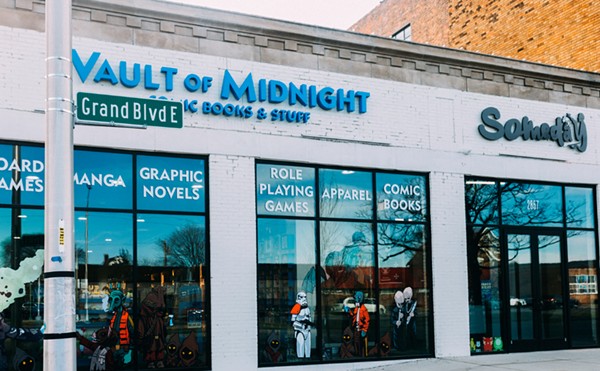The Red Bull Music Academy has been going on for five years, always in a different city, allowing 30 invitees from around the globe to come to an open forum and exchange information about the ideas and mechanics of electronic music culture. The guests explain what they do and try to spark new generations to get involved and push the envelope in their own cities. This year there were participants from at least 28 countries.
Last week, I attended the Red Bull Music Academy in London, England, where I presented a version of the history of Detroit techno. Choosing to focus on inspirations, I played Detroit radio mix tapes from the Mojo, the Wizard and Mayday. The approaches on the tapes ignited a fire in many of the students who had never heard such techniques and were surprised at how modern they sounded. (These are things that we take for granted in Detroit.) The mixes also sparked some heated debates, revealing many interesting international takes on Detroit techno. For all that we have, we often can't see how other people see us, so here are some perspectives:
In the era of electronic music, Detroit will always be considered the home of techno, and one of the main roots of the development of global dance culture.
The flip side of this is that many artists from Detroit are quite arrogant and to the Europeans come off like bitter old jazzmen. Javier from Spain said of Detroit DJs’ claim to total originality that "they were influenced by Kraftwerk and using Japanese machines."
Others echoed this sentiment and spoke about perceptions of race. In Europe, they look at these things quite differently. Torsten from Germany spoke of the huge white guilt that Germans have, and how that helped Detroit techno make such a strong impact in Germany, citing the revolutionary feeling that Underground Resistance brought to Germany circa 1991. Germany remains perhaps Detroit's biggest market.
Michelle from Johannesburg, South Africa, was excited at the parallels to Detroit culturally, that South African cities seem to be like life during wartime with much crime. Also she expressed great enthusiasm for the raw power of the rough-edged Detroit approach, and the need for more oral history from its creators.
Renate of Sao Paulo, Brazil, expressed excitement at hearing the early radio mixes and was shocked at how fresh they still sound. Sao Paulo's electronic music scene is just beginning, but Detroit techno made an early impact there via an Inner City show in 1989.
While many worship Detroit techno, others think of Detroit as one of the main sources, but with a long history of poor production, making it easy for Europeans and others with skilled engineers to improve the sound quality, leaving room for the D to be continually ripped off.
Other students expressed frustration with Detroit techno heroes: from Derrick May never releasing music again, to not being able to keep up with Carl Craig's experimentations, hoping for powerful, unique dance music and receiving mainly personal reflections. The passing of the epoch of techno was discussed.
It seems that people are beginning to realize that innovation from Detroit doesn’t always come in the form of techno, but also takes the form of house, electro and ghetto-tech. Many DJs in Europe mix electro with ghetto tracks, but a few also mix in house, among them DJ Hell. Hell was in London for a City Rocker's showcase and the UK crew showed out, ranging from Ed DMX to every press person in the UK — this music is beginning to break there.
As old hat as it is to those in Detroit, ghetto-tech is beginning to spread around the world, bringing with it new levels of cultural confusion. DJs find this music exciting because it contains raw elements of different influences, making it more of a pure, fun kind of music. Many are expecting it to go pop or become a new mixing tool for DJs ranging from house to drum ’n’ bass, giving the world some fresh irreverence. The UK has even produced its own ghetto-tech artist, Innate, who initially released Fat Girls on Disco D's GTI and is now about to be released on Nova Mute.
Valentine’s Day special
This Friday, Jeremy Kallio of ATM and Heart and Hand will present "Dirty & Sturdy: the ATM Valentine’s Day Special" at detroit contemporary (5141 Rosa Parks Blvd., Detroit — 313-898-4ART). There’ll be the usual cast of suspects, from the Omoa and Sharif party crew playing strictly hip hop, to Carlos Souffrant and Brian Gillespie to Tony Ollivera and Scott Zacharias, even Sharif himself. With this crew, the boundaries of the genre will surely stretch. The focal point of the evening is a live presentation from ATM Dance Lab featuring the music of Zach Wallace and Kevin Callaway among other drummers.
On Valentine’s Day at MixWorks, Theo Parrish will appear with special guests. The following weeks will feature Chaos of UR Live (Feb. 21) and Octave One (Feb. 28), with new resident Buzz Goree. Mixworks is at Porter Street Station (1400 Porter St., Detroit — 313-496-1480). E-mail Pitch'd at [email protected]





